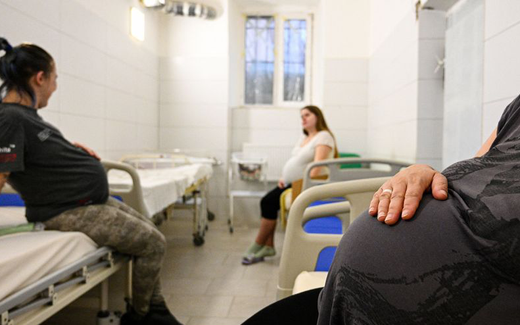Book review: Fifteen arguments against surrogacy

In 'Towards the Abolition of Surrogate Motherhood', fifteen authors provide a clear overview of secular objections to surrogacy. Photo AFP, Julien de Rosa
European Union
In the fight against infertility, an increasing group seeks refuge in surrogate motherhood. In tolerating this, European countries have crossed borders that should have remained closed, argue various experts and activists. But something is missing.
Belgium, Denmark, Germany, and the Netherlands are just a few examples of European countries that aim to regulate surrogate motherhood. Often, this desire arises from public opinion; many couples with a desire for children seek the media to share their concerns. The absence of legal frameworks 'forces' them to seek refuge in countries like Ukraine and Georgia, which seem somewhat less safe after the full-scale Russian invasion in 2022. Additionally, various celebrities received a child through surrogate motherhood in recent months, thus making surrogacy a hot topic and putting increasing pressure on governments.
"Despite the growing need for regulation, surrogate motherhood is not a new phenomenon, argues Japanese sociologist Yoshie Yanagihara. In Towards the Abolition of Surrogate Motherhood, a collection of essays on the practice, she shows that conceiving a child outside of marriage was quite common in East Asian countries such as China, Korea, and Japan. "These early surrogacy systems aimed to procure heirs, " she states. "Contract pregnancy systems existed in these countries until they were banned in the face of modernisation influenced by Western culture."
However, over seven hundred years later, surrogate motherhood has become a global phenomenon, with a market value of about 14 billion euros in 2022. According to some, this is expected to grow to 129 billion by 2032. These trends have prompted The International Coalition for the Abolition of Surrogate Motherhood (ICASM), an umbrella organisation for various feminist movements, to publish its book in multiple languages. In addition to English, Italian, French, and Spanish, a German translation was published late last year.
Dolls
The book is clearly written from a feminist perspective; some authors do not shy away from using feminist language, which may alienate more conservative readers. According to one author, a woman's desire for a child "starts being created when women are little girls and get dolls to play with." Another states that "surrogacy is still the same old exploitation of women: for the use, and benefit, of men". But despite that, it also offers interesting insights to the less feminist-inclined reader: where the term 'gestational' surrogacy is often used, "it should be noted that this term is normally used for viviparous animals, whereas the term 'pregnancy' is used for humans."
The collection of essays provides a clear overview of secular objections to surrogacy. Each of the fifteen authors presents their own argument from their own backgrounds of knowledge. With the feminist background of the book, it is logical that many authors reason from the perspective of the woman, but the rights of the child are also addressed in the book; several authors emphasise that people do not have a "right to a child."
Sometimes, that argumentation goes far. One of the authors, Catherine Lynch, an "activist working toward the abolition of both adoption and surrogacy as cruel practices (…)", calls surrogacy a further development of adoption ideology, existing to serve the adoption industry (…) and anti-abortionists." But apart from that, the book offers various arguments against surrogacy in which the child is named.
A downside of the book is that it does not feature testimonials from those with direct experience. Although some authors notice this by saying that many children born from surrogacy are too young to voice their opinions given the relatively young industry, they manage to cite adults conceived through surrogacy. An essay from such a child or a surrogate mother would have strengthened the book.
The world of surrogacy is changing rapidly. Nevertheless, the English-language book, published in 2021, provides a current depiction of surrogacy and its major secular objections. Although the practice is still a subject of debate in many countries, the market will continue to grow.
In 2015, the Austrian journalist Eva Maria Bachinger published a German book advocating for "Clear Limits." Six years later, she writes in this English version on the topic of surrogacy, "We have already crossed borders that should have stayed closed."

Towards the Abolition of Surrogate Motherhood. Marie-Josèphe Devillers and Ana-Luana Stoicea-Deram (Eds); Spinifex Press; 232 pp; €21,23.
Related Articles








